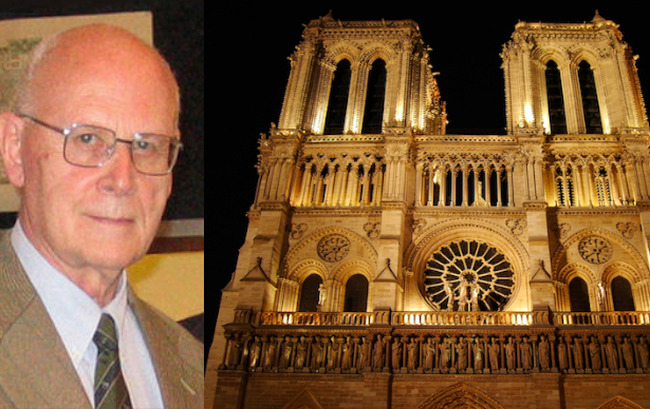by Guillaume Faye
Translated by Greg Johnson

Dominique Venner’s suicide on May 21 at Notre Dame: Marine Le Pen bowed to this gesture of awakening consciousness, which may seem surprising, but it is to her credit. A topless representative of Femen, a group of feminist buffoons, tried to smear his memory the next day, mimicking his suicide in the choir of Notre Dame. On her flat chest was painted: “May Fascism rest in Hell.” It is the second time that these naked groupies entered the cathedral with impunity, even though there is security screening at the entrance. AFP journalists were notified in advance to cover this “happening” and are therefore probably complicit.
The Leftist media and politicians (especially the pathetic Harlem Désir) together accused Venner, post mortem, of incitement to violence, of provocation. Spitting toads. Clearly Venner’s Roman gesture, as tragic as history itself, scared these people, who spend their whole lives crawling.
Venner has given his death as an example, not from despair but from hope: the symbolic sacrifice encourages our youth, in the face of the ongoing foundering of European civilization in its bloodlines and its values, to resist and fight at the cost of death, which is the price of war. A war that has begun. Venner wanted us to understand that victory can be achieved in the history of peoples if the fighters are ready to die for their cause. It is for the future generations of resistant and fighting Europeans that Dominique Venner gave his life. He was an “awakener of the people,” in the words of his friend Jean Mabire.
♣
And he killed himself, though he was not a Christian in the ordinary sense, on the central altar of Notre Dame de Paris, that is to say, the heart of one of the busiest sacred and historical places of all Europe. (Europe: Venner’s real, authentic homeland, not the marshmallow sham of the current European Union.) Notre Dame, a place of memory much richer than, for example, the Tomb of the Unknown Soldier under the Arc de Triomphe. He wanted to give his sacrifice a special meaning, like the old Roman traditions in which the life of a man, to the end, is devoted to the country he loves and must serve. Like Cato, Venner never compromised on principles. Nor on matters of necessary style—of comportment, writing, and ideas—which have nothing to do with posturing, looks, and pedantry. His sobriety displayed, in essence, the power of his lesson. A distant master, which was not unrelated to the Stoic tradition, a rebel with heart and courage not vanity and imposture, a complete man of action and reflection, he never deviated from his path. One day he told me that you should never waste time criticizing traitors, cowards, self-interested bellwethers; nor, of course, should you forgive them; just ignore them and press on. The silence of contempt.
♣
This is the Dominique Venner who, in 1970, brought me into the Resistance, which I have never denied or left since. He was my recruiting sergeant. His voluntary death — echoing Mishima’s more than Montherlant’s – is a founding act. And it filled me with a joyful sadness, like a flash of lightning. A warrior does not die in bed. The sacrificial death of this man of honor demands that we honor his memory and his work, not to mourn but to fight. But fight for what?
Not just for resistance, but for reconquest. The counter-offensive, in other words. After one of my essays in which I developed this idea, Venner sent me letter of approval in his elegant handwriting. His sacrifice will not be vain or ridiculous. The voluntary death of Dominique Venner is a call to victory.
One reply on “Tribute to Dominique Venner”
This was the first suicide in decades at the cathedral, he said. A few people had jumped to their deaths from Notre-Dame’s twin towers, but no-one was thought to have killed themselves at the altar before, he added.